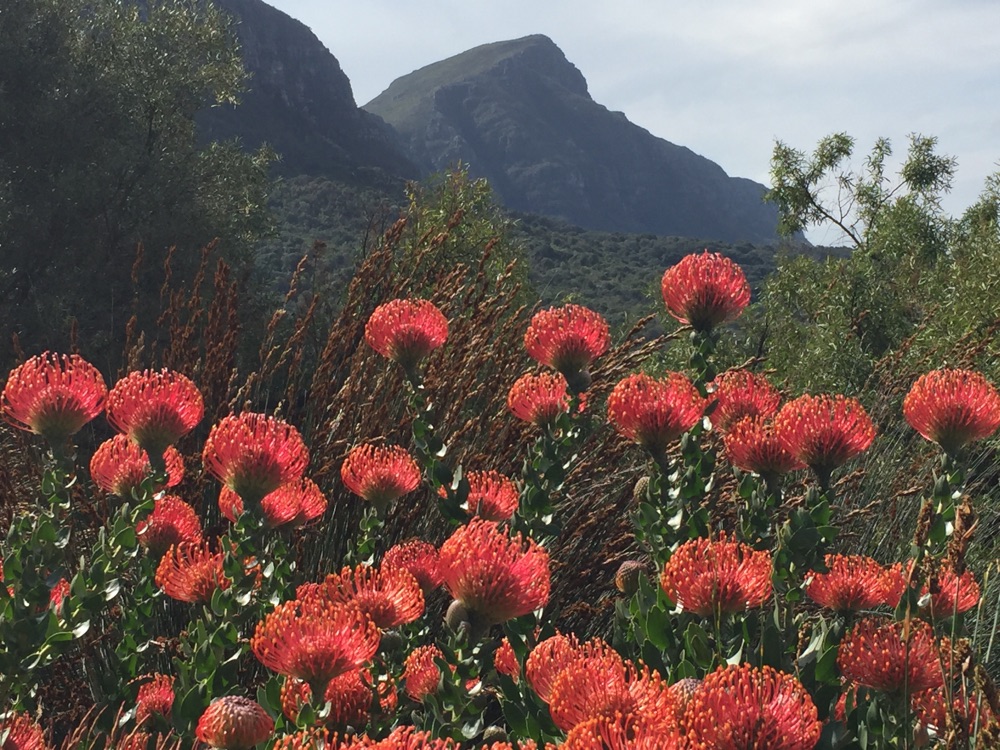
My first visit to Kirstenbosch Botanical Garden in Cape Town was five years ago. It was a fabulous visit and I got to see some spectacular plant specimens – protea, leucospermum, cycads and all sorts of other exotic plants.
However, my visit this week was somehow much more satisfying.
I’m not sure why. I again saw wonderful collections of protea and ericas and cycads but my overall experience left me much more impressed.

I think it was partly because of the route I took to explore the garden. Last time, I walked into the Rycroft Gate and went straight to the proteas and on to Fynbos Way and down into the Cycads and annuals.
This time, I started out in the Peninsula Garden and then walked up to the Fragrance Garden and up into the Pelargonium Garden and up and up the hillside to the erica and cycads and then into the tree canopy walk. In other words, I left the proteas to the last.

Kirstenbosch is still an amazing garden full of magnificent specimens. The cycad area has dinosaur statues that remind you that these are plants that have been around for millions of years, since the time of the dinosaur and beyond.

The labelling of plants in the garden was also much better this time, making it much more enjoyable to learn about unfamiliar plants.
However, before going to Kirstenbosch, we first went to Boulders Beach to see the endangered African penguins.

This is a very peaceful sanctuary. Penguins are also comic characters as they waddle around the white, silky sand and dive in and out of the blue ocean waves.
Someone said, rightly, that if you were feeling unhappy, a visit to this penguin sanctuary would be the perfect cure. They are irresistibly cute.

The next day, we bid farewell to Cape Town and headed north in the direction of Namibia and the Namaqualand. We stopped on route at the West Coast National Park where we got to see a “Lilliputian forest” comprising a lush carpet of short plants, including hundreds of varieties of restio.

In the park, we also paused several time to watch ostriches and their babies. Very cute. We also saw herds of eland and a family of bontebok while in the bird sanctuary around the lagoon we enjoyed seeing flocks of lesser flamingos.
Throughout the park, we saw yellow flowers carpeting the ground and closer to the ocean shoreline we found superb purple flowers growing on the white sand dunes.

Many of these flowers are members of the mesembryanthemum group. Others were identified easily by our very knowledgeable guide, Louis.
We stopped for the night in Saldanha Bay where outside our hotel there were superb drifts of aeonium in full bloom with dozens of beautiful yellow flowers by the ocean.

From Saldanha, we hit the N7 highway to Namibia and cruise up and up through Garies and Kharkam and Kamieskroon to Springbok in Namaqualand.

We, of course, came here to see the flowers. However, we were not told there has been a severe drought here since October last year with less than a third of the normal rainfall. They are also in the middle of a new drought with temperatures soaring into the high 30s and even touching 40-45 degrees.
 Apparently, many of the flowers have already been scorched but we are heading out today to find more flowers.
Apparently, many of the flowers have already been scorched but we are heading out today to find more flowers.
Our solution was to get a local resident to take us in three special vehicles up the mountain to where flowers are in abundance and views are excellent.

























